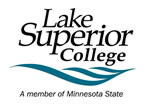Part 1: Policy Statement
Lake Superior College is committed to ensuring its programs, services and activities are accessible to individuals with disabilities, through its compliance with state and federal laws. Lake Superior College is also committed to providing equal opportunities for qualified individuals with disabilities to participate in college programs, services, activities, and employment. Lake Superior College recognizes that individuals with disabilities may need accommodations to have equally effective opportunities to participate in or benefit from the College’s programs, services, activities and employment.
Part 2: Definitions
Subpart A: An individual with a disability
-
- Any person who has a physical, sensory, or mental impairment which substantially or materially limits one or more of the person’s major life activities, or
- Any person who has a record of such impairment which means that a person has a history of or has been classified as having a physical, sensory, or mental impairment that substantially limits one or more major life activities, or
- Is regarded as having such an impairment.
Subpart B: Qualified individual with a disability
An individual who, with or without reasonable modifications to rules, policies, or practices, the removal of architectural, communication, or transportation barriers, or the provision of auxiliary aids and services, meets the essential eligibility requirements for receipt of services or participation in a college program or activity. Essential eligibility requirements include, but are not limited to, academic and technical standards requisite to admission or participation in an education program or activity.
Subpart C: Major Life Activities
Major Life Activities may include, but are not limited to, caring for oneself, performing manual tasks, seeing, hearing, eating, sleeping, walking, standing, lifting, bending, speaking, breathing, learning, reading, concentrating, thinking, communicating, and working. Major life activities also include the operation of a major bodily function, including but not limited to, functions of the immune system, normal cell growth, digestive, bowel, bladder, neurological, brain, respiratory, circulatory, endocrine, and reproductive functions.
Subpart D: Personal devices and services
Personal devices and services may include wheelchairs; individually prescribed devices, such as prescription eyeglasses or hearing aids; readers for personal use or study; or services of a personal nature including assistance in eating, toileting, or dressing.
Part 3: General Access Policy
Lake Superior College will provide access to programs, services, employment and activities to qualified individuals with known disabilities as required by law.
Lake Superior College does not provide personal devices or services that may pose undue financial or administrative burdens. The College does not provide assessment services that attempt to diagnose various disabilities or provide funding for individuals to receive off-site testing. Diagnostic assessment referrals and information are available for students in Student Accessibility Services.
Part 4: Availability and Notice
Lake Superior College shall post notices in an accessible format to the public describing:
-
- The prohibition against discrimination on the basis of disability, and
- The contact information for the persons designated to provide information about or respond to requests for reasonable accommodation.
Part 5: Reasonable Accommodations
Subpart A: Access to Programs, Services, Activities
Lake Superior College shall make reasonable accommodations to ensure access to programs, services, and activities as required by law. Access means that a qualified individual with a disability will not be excluded from participation in or be denied the benefits of the programs, services, activities, nor will the individual be subjected to discrimination.
Reasonable accommodations may include modifications to rules, policies, or practices; the removal of architectural, communication, or transportation barriers; provision of auxiliary aids or the provision of equally effective programs, services, or activities.
In accordance with the Americans with Disabilities Act, accommodations will not be provided for the following:
-
- personal devices or services even though the individual may be a qualified individual with a disability, or
- that result in a fundamental alteration in the nature of a service, program, or activity or in undue financial or administrative burdens.
Subpart B: Employees and Applicants
Lake Superior College has procedures to request access to reasonable accommodations for employees, applicants and students. Access means that a qualified individual with a disability will not be excluded from participation in or be denied the benefits of the programs, services, activities, or employment nor will the individual be subjected to discrimination.
Employee and applicant requests for reasonable accommodations or modifications in public programs, services, activities, and employment must be made in accordance with the following procedures:
Requests for reasonable accommodations require supporting medical documentation from a qualified professional that supports the nature of the disability that substantially limits the individual’s ability to function in the employment setting.
Documentation of a disability must include the following:
-
- Identification of the nature and severity of the individual’s disability.
- Specific information regarding the manner in which the disability affects or limits the individual.
- Suggestions and recommendations regarding possible accommodations.
- The documentation needs to be dated and signed by both the individual and the medical provider.
Subpart C: Student Requests – Offered and/or Sponsored Services or Activities for Qualified Students with Disabilities
Lake Superior College provides qualified students, with a disability, access to services and activities that are operated or sponsored by the institution or that receive significant assistance from the institution. Such access shall be provided in a reasonable manner as required by law. At a minimum, the following is available to qualified students with disabilities:
-
- Support, counseling, and information services that may include support groups, individual counseling, career counseling and assessment, and referral services;
- Academic assistance services that may include assistive devices, early registration services, early syllabus availability, course selection, program advising, course work assistance, testing assistance and modification, and tutoring; and
- Coordination services that may include personnel acting on the student’s behalf and serving as the primary contact and coordinator for students needing services, assistance in working individually with faculty and administrators, intervention procedures, and grievance procedures.
Student requests for reasonable accommodations require supporting medical documentation from a qualified professional that supports the nature of the disability that substantially limits the individual’s ability to function in the academic setting.
Student requests for reasonable accommodations or modifications in public programs, services, activities, and an academic setting must be made in accordance with the following procedures:
-
- Procedure 1B.4.2 Reasonable Accommodations for Students (link to procedure 1B.4.2 – in process)
Subpart D: Community Member or General Public Requests
Community member or general public requests for reasonable accommodations or modifications in public programs, services, or activities must request an accommodation or schedule a meeting with the Disabilities Services Office:
Subpart E: Reasonable Accommodation Grievance Procedure Under Title II of the Americans with Disabilities Act of 1990 (“ADA”)
Anyone who wishes to file a complaint alleging discrimination on the basis of disability in the provision of services, activities, programs, academics, employment, or benefits by the Lake Superior College must do so in accordance with the following procedure:
Related Documents:
Minnesota State Board Policy 1B.4 Access and Accommodations for Individuals with Disabilities
Systems Procedure 1B.0.1, Reasonable Accommodations in Employment
MMB HR/LR Policy #1433 ADA Reasonable Accommodation.
Notice Under the Americans with Disabilities Act
LSC Procedure 1B.4.1 Reasonable Accommodations in Employment
LSC Procedure 1B.4.2 Reasonable Accommodations for Students
To view any of the following related statutes, go to the Revisor’s Office website. You can conduct a search from this site by typing in the statute number
History
1B.4 related procedures previously included in policy 1B.4. Updated Policy 1B.4 to policy only. Created new related procedure 1B.4.1 Reasonable Accommodation in Employment, March 2022 (review ongoing). Created new related procedure 1B.4.2 Reasonable Accommodation for Students (in process), created related Grievance Procedure 1B.4.3 Americans with Disabilities Act (“ADA”) Title II (non-employee) Reasonable Accommodation/Modification in Public Programs, Services, or Activities Requests, and Academics, or Employment, created March 2022 (review ongoing).
Date Implemented: Policy 1B.4 implemented May 3, 2001
Date Reviewed/Updated: December 2020; March 2022 (review ongoing)
President’s Signature Date: September 22, 2022

- Minnesota State Policy
- ADA Medical Inquiry Healthcare Provider Form
- ADA Title II (non-employee) Reasonable Accommodation Request Form
- Authorization for Release of Medical Information ADA
- Employee/Applicant Request for Americans with Disabilities Act (“ADA”) Reasonable Accommodation Form
- ADA Accommodation Process Documentation Release to Union


